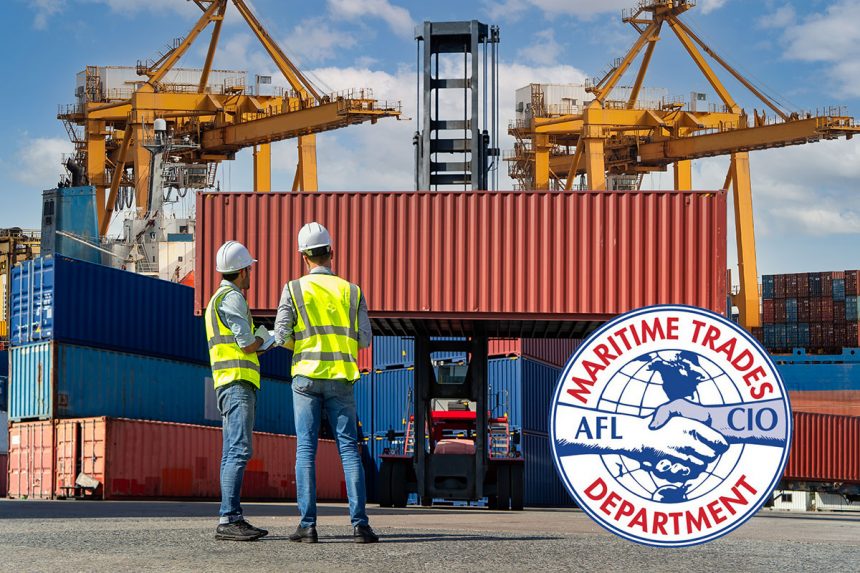With cabotage in the crosshairs of the uninformed, the MTD devoted the majority of its two-day meeting to discussion and updates on the Jones Act as well as similar laws in other nations.
Guest speakers addressing the board, which met March 8-9 near Orlando, were American Federation of Teachers President Randi Weingarten; National Shipping of America President Torey Presti; TOTE Maritime Puerto Rico President Tim Nolan; Crowley Maritime Senior Vice President and General Manager, Puerto Rico Services John Hourihan; and Seafarers’ Rights International (SRI) Executive Director Deirdre Fitzpatrick. U.S. Sen. Kamala Harris (D-CA) and U.S. Rep. Cedric Richmond (D-LA) sent video greetings that included shout outs for the Jones Act.
The board also heard from Seafarers Union of Canada President Jim Given; Steve Bertelli, international secretary-treasurer of the Bakery, Confectionery, Tobacco Workers and Grain Millers International Union; and, from the International Association of Machinists, Juan Negron, chief of staff for the eastern territory, and Gil Simmons, assistant general chair of District 141.
Noting that it’s unusual for the board to devote most of an entire meeting to one subject, MTD President Michael Sacco described ongoing attacks against the Jones Act that are threatening American jobs along with national, economic and homeland security.
On the books for nearly a century, the Jones Act requires that cargo moving between domestic ports be carried on vessels that are crewed, built, flagged and owned American. The law helps maintain nearly 500,000 U.S. jobs and contributes billions of dollars annually to the economy.
“Lies are still being told about the Jones Act,” Sacco stated in his opening remarks. “This goes back to Hurricane Maria and Puerto Rico. I’m not sure I’ve ever seen anything quite like the storm of misinformation that followed…. Our industry has done a good job of pushing back and promoting the truth, and that includes great work by Crowley and TOTE and National Shipping of America and others, but this fight is a long way from over. There are similar fights happening in other countries, including Canada and Australia.”
One of the more noteworthy statistics cited during the meeting came from Fitzpatrick, who reported that a new study shows at least 91 nations maintain some form of maritime cabotage law.
Meanwhile, the board adopted numerous statements backing the Jones Act and other nations’ respective cabotage laws, along with ones supporting American shipbuilding, the U.S. Export-Import Bank, solidarity with the citizens of Puerto Rico, an LNG terminal in the Pacific Northwest, America’s troops and veterans, public employees’ rights, cargo preference, infrastructure investment, protecting Mine Workers’ pensions, and more.
The Jones Act statement read in part, “Critics wrongly claimed (going back to September 2017) that the Jones Act hampered relief efforts in Puerto Rico in the wake of Hurricane Maria. Even though nothing could have been further from the truth, Jones Act opponents used their flawed accusations as a foundation to call for weakening or eliminating the law. It was of little consequence to them that the backdrop for their claims showed stacks and stacks of containers delivered to the San Juan docks by U.S.-flag vessels. They neglected the fact that Jones Act ships were on the scene in Puerto Rico within hours after the first port reopened and that these vessels continue to deliver vital cargoes even today. They completely overlooked the fact that because of damaged roads and numerous other infrastructure problems, significant portions of the waterborne cargo initially stayed in the ports. They coasted right past the fact that none of these circumstances had anything to do with any maritime law.”
Additionally, the statement supporting Puerto Rico residents included the following: “The MTD takes this opportunity to convey a very important message to all of our brothers and sisters in Puerto Rico. Namely, we are with you. We were there from the start of the recovery, and we will be there right through to the end.
“AFL-CIO unions – including MTD affiliates – represent 100,000 Puerto Rican residents, and union members have been involved in every phase of the recovery and rebuilding effort,” the statement continued. “We have contributed not only money, but also manpower. For instance, shortly after the hurricane, more than 300 skilled union volunteers – including doctors, nurses, electricians and heavy equipment operators – traveled from the mainland to Puerto Rico to provide assistance. And, Jones Act ships were at the piers as soon as they reopened, bringing the first wave of relief cargoes.”

